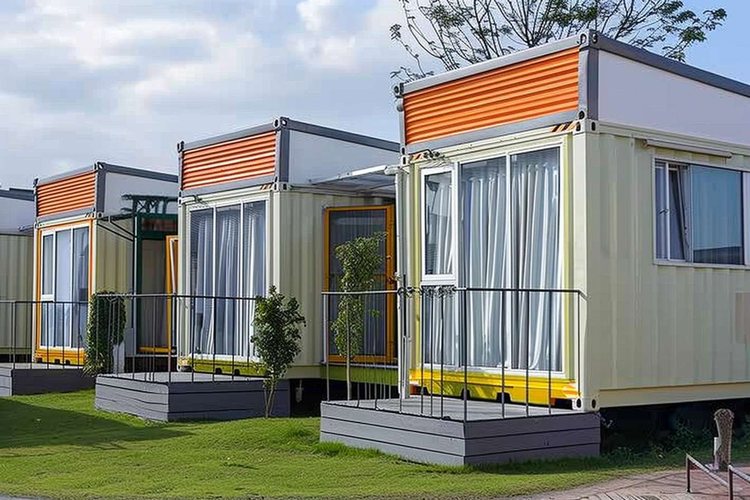Shipping Container Homes: Modern Housing Solutions Explained
Shipping container homes have emerged as an innovative housing solution that transforms industrial cargo containers into livable residential spaces. These structures offer an alternative approach to traditional construction, combining recycled materials with contemporary design principles. As housing costs continue to rise across Belgium and Europe, container homes present a practical option for those seeking sustainable and cost-effective living arrangements.

What Are the Benefits of Shipping Container Homes
Container homes provide numerous advantages that appeal to modern homeowners. Durability stands as a primary benefit, as shipping containers are designed to withstand harsh ocean conditions and heavy cargo loads. This structural integrity translates into homes that can resist extreme weather conditions and require minimal maintenance over time.
Environmental sustainability represents another significant advantage. By repurposing used shipping containers, homeowners reduce construction waste and give new life to materials that might otherwise occupy landfill space. The construction process typically generates less waste compared to traditional building methods, making container homes an environmentally conscious choice.
Speed of construction offers practical benefits for those eager to move into their new homes. Container homes can be completed in weeks or months rather than the extended timelines associated with conventional construction. This efficiency stems from the pre-existing structure of the container, which serves as the foundation and framework simultaneously.
How Container Homes Combine Style, Efficiency, and Affordability
Modern container homes demonstrate that industrial materials can create stylish living spaces. Architects and designers have developed innovative techniques to transform stark metal boxes into comfortable, aesthetically pleasing homes. Large windows, creative layouts, and thoughtful interior design choices help create bright, welcoming spaces that rival traditional homes in comfort and appeal.
Energy efficiency can be optimized through proper insulation and strategic design choices. Container homes require thorough insulation to address the metal structure’s tendency to conduct heat and cold. When properly insulated, these homes can achieve excellent energy performance, reducing heating and cooling costs throughout the year.
The modular nature of containers allows for flexible design options. Homeowners can combine multiple containers to create larger living spaces or stack them for multi-story configurations. This flexibility enables customization based on family size, budget constraints, and lot dimensions.
Discover Container Homes: Affordable, Modern, and Functional Features
Container homes offer numerous functional features that enhance daily living. Open floor plans maximize the usable space within the container’s dimensions, while cleverly designed storage solutions help organize belongings efficiently. Many container homes incorporate fold-down furniture and multi-purpose elements to optimize space utilization.
Modern amenities can be seamlessly integrated into container home designs. Full kitchens, bathrooms, and living areas fit comfortably within properly planned container spaces. Advanced electrical and plumbing systems ensure that residents enjoy all the conveniences expected in contemporary homes.
Customization options allow homeowners to personalize their container homes according to their preferences and needs. Exterior finishes can range from natural wood siding to modern metal panels, while interior designs can reflect any style preference from minimalist to rustic.
Container Home Construction and Design Considerations
Successful container home projects require careful planning and professional expertise. Structural modifications must be executed properly to maintain the container’s integrity while creating necessary openings for doors and windows. Professional engineers should evaluate any structural changes to ensure safety and compliance with local building codes.
Insulation installation demands particular attention in container home construction. Spray foam insulation, rigid foam boards, or blanket insulation can be used, depending on the specific climate conditions and budget considerations. Proper vapor barriers prevent condensation issues that could lead to moisture problems within the home.
Foundation requirements vary depending on local conditions and building codes. Some container homes utilize concrete slab foundations, while others employ pier or crawl space foundations. Local building departments can provide guidance on appropriate foundation types for specific locations and soil conditions.
| Provider Type | Service Offered | Cost Estimation (EUR) |
|---|---|---|
| DIY Container Purchase | Used 40ft shipping container | €2,000 - €4,000 |
| Basic Conversion Kit | Insulation, windows, doors | €8,000 - €15,000 |
| Professional Build | Complete turnkey container home | €35,000 - €80,000 |
| Luxury Container Home | High-end finishes and systems | €80,000 - €150,000 |
Prices, rates, or cost estimates mentioned in this article are based on the latest available information but may change over time. Independent research is advised before making financial decisions.
Regulatory Considerations for Container Homes in Belgium
Building regulations and zoning laws significantly impact container home projects. Belgian municipalities maintain varying policies regarding alternative housing structures, making it essential to research local requirements before beginning any container home project. Some areas welcome innovative housing solutions, while others maintain stricter traditional construction requirements.
Permit applications for container homes typically require detailed construction plans and engineering specifications. Working with local architects and contractors familiar with container home construction can streamline the approval process and ensure compliance with all applicable codes and regulations.
Container homes represent a viable housing alternative that addresses modern concerns about affordability, sustainability, and efficient construction. While these homes require careful planning and professional guidance, they offer unique opportunities for homeowners seeking distinctive, environmentally conscious living spaces. Success with container home projects depends on thorough research, proper professional support, and realistic expectations about costs and construction timelines.




